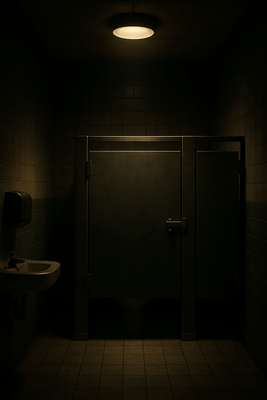
You walk into the bathroom, lock the door, and start to cry. No one to ask why, no breaks, no one to blame you. Just a short time to stop acting like all is fine. If this rings a bell, know you're not by yourself.
Maybe you're a student quietly sobbing between classes, a worker drying your eyes before a talk, or a mom or dad who slips away to the only still spot at home, the bathroom has become an odd place of comfort for letting out emotions. And the act of weeping there-quiet and out of sight is very, very usual. We live in a world where staying cool is needed and being open is too much trouble. Showing feelings-mostly out in the open is often seen as weak, too much, or not right for work. So, we keep it in. We push down our feelings. And we wait. Until we are alone in a bathroom-where it's quiet, the door locks, and there's just a bit of time to let go. Crying in bathrooms is not a mark of being unstable, it's often the only safe spot many of us find we can have. This piece looks into the mind, heart, and social causes for this, showing that these silent meltdowns are not just usual-they're normal.
1. Restrooms as Safe Zones: Privacy in a World That Watches

Private spaces offer escape from emotional pressure and performance.
We are always around-people, wants, loud sounds, and eyes on us. In this kind of world, to be by oneself can seem like a rare thing. That is where restrooms help, not just as places to go, but as spots where one can feel safe. Unlike big work areas or school rooms, bathrooms offer a short break. And when we feel too much-worry, sadness, anger, this alone time is key. It's not only for being unseen. It's for the okay-to cry, take deep breaths, yell in silence, or just be without the need to show off. For some short time, the mask can drop. The steps are often the same: go in soft, let tears fall light, touch up or splash your face, and step out like all is fine. It’s quick care in a place not made to heal, but that gives comfort still.
2. The “I’m Fine” Lie: How We Bottle It Up Until We Break

Suppressed feelings build up until they overflow in private.
We often say "I'm fine" without thinking. In talks, group texts, at school, and even with good friends, we usually answer "How are you?" with a fake smile. Yet, under that lie are debts, school stress, hidden sadness, bad feelings about our bodies, or just life being tough. These kept-in feelings do not just go away. They build up. If you do not have good ways to let out these feelings, they burst out over small things-often when you're alone in a bathroom. It happens a lot to: People who look calm but are really anxious. The tears in the bathroom are not for no reason. They come from all that piled-up stress.
3. Cultural Conditioning: Why Public Vulnerability Still Feels Shameful

Society shames vulnerability, forcing emotions behind closed doors.
As kids, we learn to hold back our feelings. "Don't cry out loud." "Stay tough." "You're too much." "What will others say?" Such lessons build a strong fear of being open when we feel small. We put off our feelings until we're alone-with a shut bathroom door. Women must act poised, men should not cry, and showing pain is often seen as shameful or weak. This fear about showing our feelings makes us feel alone. Bathrooms turn into places where we can finally let our emotions out, away from what everyone else thinks we should feel.
4. The Body’s Breaking Point: When You Physically Can't Hold It Anymore

Unreleased stress manifests physically and demands emotional release.
Crying is the body's way to let out stress. It shows that something-big or small needs to be let go. When you hold in feelings, they don't just leave. They stay in your chest, neck, belly, and arms. You might not cry at work or in class but your body holds on. And then, it needs to let go. The bathroom turns into the spot where all that held-in stuff comes out: Your heart beats fast. Your neck feels tight. Your eyes burn. Your legs feel weak. And then, you find yourself crying quietly, not sure why-but you know you need to.
5. From Shame to Self-Compassion: How to Reframe the Cry

Crying is healing-normalize emotional release without guilt.
What if we saw crying in washrooms not as shame, but as brave? Crying isn't a sign of being weak, it shows your body is taking care of itself. It means being true about how you feel. It brings comfort. And at times, it means you're just trying to get by. So here's what you could do next: Don't say sorry for needing to let it out. Name your feelings-mad, scared, alone. Check your body after you cry. Where does it feel less heavy? Talk to someone if possible. Make it normal to show feelings in safe spots. Washrooms have done their part-but feeling good out loud needs more than just locked doors and quiet tears. It needs light, gentleness, and being kind to yourself.
So in conclusion : Next time you cry in a bathroom stall, know this: you're not alone or weak. Crying softly in a stall isn't weird, too much, or bad. It's human. It's what happens in a world that often doesn't let us stop, feel, or get better in open places. A place that likes when we hide how we feel but is hard on us when we break down. But in that bathroom, you were real at last. You let yourself feel. And in a world that keeps us from showing feelings, that’s a big step in caring for yourself. Tears in a bathroom aren't a mark that you're not whole. They whisper from deep in you, telling you: You've kept it all in for too long. It's fine to let go now. And maybe, just maybe, it's time we start to cry in places that are safe-not because we are less strong, but because we are being true at last.
FAQs(Frequently Asked Questions) :
Because it offers privacy, safety, and freedom from judgment.
They often follow long-term emotional buildup and daily stress.
Yes, prolonged suppression can lead to burnout and anxiety.
-
Mobile snatching gang held in Hyderabad, property worth Rs 3.5L recovered

-
Malta to recognise Palestinian state in September

-
Gujarat ATS arrests woman for promoting Al-Qaeda content online

-
Bihar Assembly elections: AIMIM begins looking for candidates

-
Parwarish actor calls Namaz ‘shirk’, mocks Islam, video resurfaces
